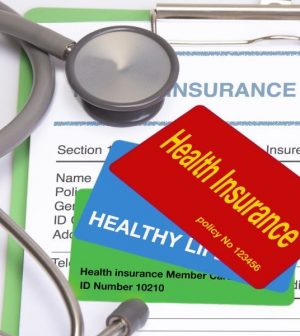- Recognizing the Signs of Hypothyroidism
- 10 Strategies to Overcome Insomnia
- Could Artificial Sweeteners Be Aging the Brain Faster?
- Techniques for Soothing Your Nervous System
- Does the Water in Your House Smell Funny? Here’s Why
- Can a Daily Dose of Apple Cider Vinegar Actually Aid Weight Loss?
- 6 Health Beverages That Can Actually Spike Your Blood Sugar
- Treatment Options for Social Anxiety Disorder
- Understanding the Connection Between Anxiety and Depression
- How Daily Prunes Can Influence Cholesterol and Inflammation
Buying Your Own Health Insurance Just Got Way Less Expensive

Tens of millions of Americans will find it substantially more affordable to buy their own health insurance starting this month, thanks to generous financial help included in the American Rescue Plan Act (ARPA) signed by President Joe Biden in March.
That includes many people who’ve already bought a plan for this year, as well as people who don’t have insurance right now.
Health policy experts are urging everyone who buys their own health insurance to visit HealthCare.gov during the pandemic-prompted extended open enrollment period that runs through Aug. 15, to take advantage of the new subsidies offered under the ARPA.
You’re very likely to find a better deal on your health insurance than you now have.
“It’s not just for uninsured people to come into the market. It’s also for people who are already buying a plan to switch into a different plan,” Kaiser Family Foundation Vice President Cynthia Cox said of the open enrollment period during a recent briefing on the ARPA’s health care provisions.
“For people who are in higher income groups, they may find they’re able to afford a plan that has a lower deductible,” Cox continued. “Someone who’s buying a bronze plan may find they can actually afford to buy a silver plan now with these subsidies, and could have a lower deductible payment.”
The ARPA provisions, which will run through 2022, ensure that no one buying marketplace coverage will pay more than 8.5% of their income in premiums — regardless of what they make.
Health insurance will only cost 8.5% of your income
“This bill says, we don’t care what your income is. If you need financial help so that you can get insurance for a cost of just 8.5% of your income, you get that financial help,” said Stan Dorn, director of the National Center for Coverage Innovation at Families USA, a non-profit health care consumer advocacy group.
People earning up to 150% of the federal poverty level (about $19,000 for an individual and $39,000 for a family of four) can now get a silver plan for zero premium, and also will benefit from cost-sharing subsidies that slash their deductible, said Karen Pollitz, a senior fellow at the Kaiser Family Foundation.
“The average silver plan deductible this year is close to $5,000, but the most generous cost-sharing subsidy reduces that deductible to less than $200,” Pollitz said during the briefing.
Folks who make more also will benefit from the ARPA’s generous subsidies. This includes people with incomes more than four times the poverty rate, who didn’t previously qualify for financial help in the health insurance marketplaces.
“The ARPA lowers premium payments for everyone across the board, pretty much — 92% of people who buy their own insurance are eligible for subsidies now,” Cox said. “Of that 8% who aren’t getting a subsidy, those are really high-income people who pay less than 8.5% of their income for a premium without a subsidy.”
These new benefits took effect at HealthCare.gov on April 1.
To find out how they might help you, go to the website and choose the “report a life change” option, then click “change to my household’s income,” according to financial counselors at the University of Michigan School of Medicine.
New options include paid COBRA premiums
It doesn’t matter if your income hasn’t actually changed — this step is required to submit your application and get to the Plan Compare section of the site, where you can review the options now available to you. You can then either keep your plan or choose a new one.
Keep in mind that whatever deductible you’ve met on your existing plan will be erased if you go to a new plan, and you’ll be starting from scratch. You also should check to make sure your doctor participates in your new plan.
Other health care provisions of the ARPA are still in the works, but should come online soon, experts said.
For example, the federal government will pay 100% of COBRA premiums for laid-off workers for up to six months this year, including people who lost their jobs earlier in the pandemic.
Many laid-off workers can’t afford COBRA because they are required to pay the full premium cost for their insurance, Dorn said.
“It’s a huge amount of money that very few people can afford, so very few people have been able to take advantage of COBRA,” Dorn said. “This new law says that at least for the months from April through September, the federal government is going to pay your COBRA premium, so laid-off workers can get affordable coverage.”
Employers are supposed to reach out to those who qualify, but you should reach out to your human resources person and ask about it.
People receiving unemployment benefits also will be eligible for enhanced insurance marketplace subsidies during 2021, but those are going to take longer to implement, Pollitz said. That program is expected to start sometime this summer.
More information
The Kaiser Family Foundation has more about the health insurance subsidies in the American Rescue Plan Act.
SOURCES: March 25, 2021 media briefing with: Cynthia Cox, MPH, vice president, Kaiser Family Foundation, and Karen Pollitz, MPP, senior fellow, Kaiser Family Foundation; Stan Dorn, JD, director, National Center for Coverage Innovation at Families USA; Michigan Medicine/University of Michigan, news release, April 1, 2021
Source: HealthDay
Copyright © 2026 HealthDay. All rights reserved.










